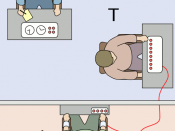"Befehl ist Befehl" is German for "only following orders". It was a common defense used at the Numberg Trials in Germany for crimes against humanity after World War II. Since then it's been thrown out as a viable excuse for the treacherous acts done during the Holocaust and throughout the world. But how easy is it to fall under the command of obedience? Countless experiments have been performed, some of the most renowned being Milgram's electroshock teacher/learner experiment and Zimbardo's prison experiment. History is stricken with examples, from the large scale of Nazi Germany to the everyday occurrence of police abusing their power for an ego trip. Millions of dollars have been spent to research things such as the bystander effect, groupthink, and others. Yet time and time again thousands of people fall victim to the same old traps. Why is this, and more importantly, what can we do to stop unquestioned obedience and authority?
Most people do not wish to kill other innocent civilians for no particular reason at all.
In the 1960s, Adolf Eichmann, a former Nazi officer, was put on trial for his treacherous acts done during World War II. His defense was the typical excuse of he was "only following orders", and this caught the attention of Stanley Milgram. As David Myers explained in his book, Exploring Psychology, in 1974 Milgram was a professor at Yale intrigued by the fact that people could be that mindlessly obedient. He decided to devise an experiment that would "measure the willingness of a participant to obey an authority who instructs the participant to do something that may conflict with the participant's personal conscience"(Myers 52). In Milgram's experiment, he had a "teacher" (a volunteer) ask questions and then press buttons that would supposedly shock the strapped down "learner"in...



Excellent
Very well written. Shows great compassion for human beings and gives much insight.
7 out of 7 people found this comment useful.